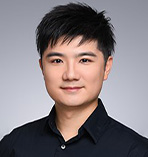
Tsinghua Shenzhen International Graduate School
Dr. Tingzheng Hou is an Assistant Professor at the Institute of Materials Research at Tsinghua Shenzhen International Graduate School. He received his Ph.D. in Materials Science and Engineering from the University of California, Berkeley in 2021. Following his doctoral study, he worked as a postdoctoral scholar at UC Berkeley until 2022. He obtained his M.S. in Chemical Engineering in 2016 and his B.S. in Materials Science and Engineering in 2014 from Tsinghua University. His research focuses on the computational modeling and rational design of novel energy storage materials, the development of high throughput computational infrastructures, and the application of artificial intelligence in materials research. He has authored or co-authored 26 refereed research papers with a total citation of over 6,600. He has been awarded the Chinese Government Award for Outstanding Self-financed Students Abroad (2022), the First-class Natural Science Award by China Ministry of Education (2019), and the China Top Cited Author Award from IOP Publishing (2018). He actively contributes to the Materials Project as a core developer and serves as an invited peer reviewer for Nature Catalysis, Nature Communications, Journal of the American Chemical Society, Advanced Functional Materials, etc.
Advanced energy materials play a pivotal role in driving the global transition towards carbon neutrality. In the past decade, computational research has emerged as a fundamental catalyst for the discovery of novel materials, particularly in light of the promising advancements in artificial (general) intelligence. In this talk, I will introduce how theoretical insights from multi-scale modeling have facilitated the rational design of energy materials. Subsequently, the significance of expanding our knowledge through the acquisition of high-quality data spanning the vast chemical landscape of potential candidate materials will be discussed. Moreover, recent applications of statistical learning and AI methods to expedite materials development will be briefly highlighted. Finally, I will share some perspectives on future directions and optimal practices in the area of computational materials science.